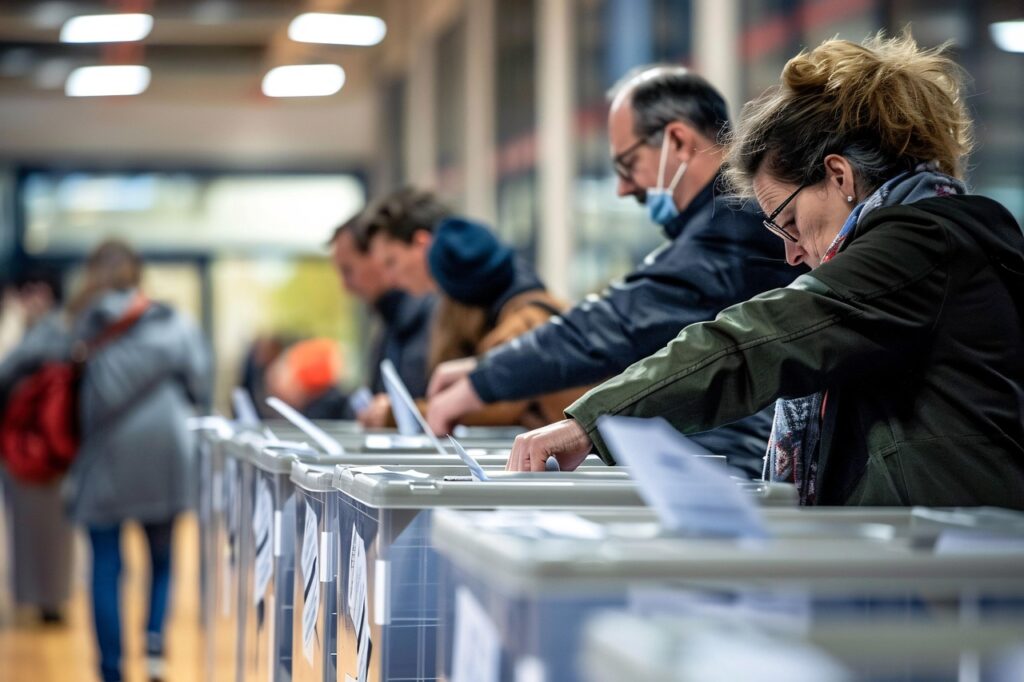In a country like the United States, which is known for its democratic principles, the right to vote is highly prized. Foreign nationals living in the US are just as interested in American politics as any other demographic, from state and local council races to the presidential race. Some of these people are here legally because they are students, namely thousands of people on F1 visas, who are here on temporary nonimmigrant student visas. Students from other countries often ask, “Can F1 visa students vote in USA elections?”
In this detailed guide, we will look at the consequences, duties, and legal implications of voting while on an F1 visa. Everyone, from recent immigrants to students nearing graduation, must be familiar with U.S. immigration rules in order to exercise their rights and avoid violations.

What is an F1 Visa?
An F1 nonimmigrant visa is granted to international students who want to study academic courses or take part in language training programs in the US. In order to maintain full-time enrollment at an authorized U.S. institution and establish they have sufficient funds to support themselves while in the country, F1 visa holders are required to provide evidence of both.
Key features of the F1 visa include:
- Trip to the US for school purposes however short
- Direct citizenship is not an option
- Should not accept unauthorized tasks
- Upon completion of the academic program, students are required to leave the United States unless their visa status is modified
Due to the educational nature of the F1 visa, its recipients are not considered citizens or permanent residents of the United States. Because of this discrepancy, voting rights are severely affected.
Are F1 Visa Students Eligible to Vote in American Elections?
Put another way, students in the United States on F1 visas cannot vote. Municipal, state, and federal elections are all included in this. The right to vote is reserved for legal permanent residents of the United States. Conforming to the requirements of federal law:
“Voting in federal elections shall be restricted to U.S. citizens only.” [United States Code, Title 18, Section 611]
Since they do not meet the citizenship requirement, those holding F1 visas are not able to vote since they are considered nonimmigrants.
Categories of Elections Wherein F1 Visa Holders Are Not Authorized to Cast Ballots
Notifying F1 visa holders about the following elections will help avoid legal complications:
1. Voting in Federal Elections
This includes:
- Presidential elections
- Senate races in the USA
- Contests for representation in Congress
Only citizens of the United States are eligible to vote in these elections. No F1 students are permitted.
2. State Elections
A few examples are:
- Head of state
- State Representatives
- State Ballot Measures
These elections are conducted at the state level, although being a citizen of the United States is still a requirement to vote.
3. Municipal Elections
These might include:
- Municipal Boards
- Local Government Elections
- Education Commissions
Voting rights for noncitizens have been granted by certain municipal governments; however, such legislation is rare and often does not include F1 visa holders.
Consequences of Illegally Casting an F1 Visa Vote
Legal ramifications might be severe for an F1 visa student who attempts to vote or register to vote. This includes:
1. Removal from the Country
Under current immigration laws, non-citizens are unable to cast ballots. There are processes that may be followed in the event of deportation from the US.
2. Life-Prolong Reject
A person’s ability to return to the US, even as a tourist or green card holder, is severely limited after deportation for voting unlawfully.
3. Grand Jury Reports
Under federal law, it is a felony to vote illegally. Penalties may include imprisonment, fines, and the establishment of a permanent criminal record.
4. The Decrease in Immigration-Related Advantages
Voting illegally may jeopardize any chance of changing your status or getting a green card in the future, even if it’s via marriage or a job.
Is It Possible for Students on F1 Visas to Cast a Ballot?
Voter registration is not available to students on F1 visas. The student may have broken federal and state laws just by registering to vote, regardless of whether or not they actually use their ballot.
Keep an Eye Out for DMV Mistakes
Unknowingly enrolling to vote is a common occurrence for F1 students when they seek for state IDs or driver’s licenses. In some DMV systems, the option to register to vote is presented automatically while applying for a driver’s license.
To avoid accidental registration:
- Do everything it takes to avoid registering to vote
- Make it very obvious that you do not possess the citizenship status when asked
- Before submitting, double-check all papers
If a Formula One Student Votes Incorrectly, What Will Happen?
A vote mistake, no matter how unintentional, might nonetheless have far-reaching consequences. However, purpose is relevant in law. In the event that you believe that you registered or voted by mistake:
- Stay away from the voting booth
- Get in touch with a lawyer immediately
- Consulting your Designated School Official (DSO) may provide you with guidance
- Notify your local election office that you would want to cancel your voter registration
You may lessen the likelihood of facing legal consequences by fixing the mistake quickly, but it won’t prevent them entirely.
Common Misconceptions About Immigration Status and Voting
1. “Everyone living in the U.S. can vote.”
The statement is false. Only citizens of the United States are allowed to vote in federal and most state elections.
2. “Registering to vote helps prove community involvement for green card applications.”
The statement is false. It might potentially jeopardize any immigration application as it violates nonimmigrant status.
3. “No one will find out if I vote.”
The statement is false. Details on who has voted and when are part of the public record. Immigration officers may and frequently do access this data while conducting background checks.
What Are the Requirements for Students on F1 Visas to Be Able to Vote?
Even if voting is not allowed, F1 students may still participate in politics in many other meaningful ways:
1. Volunteer in a Non-Partisan Capacity
Vote monitors, translators, and logistical assistants are positions open to non-citizens in some election offices. Always check the qualifying requirements.
2. Engage in Academic Research
Scholarly examination of U.S. elections is not only permissible, but encouraged, for students majoring in political science, sociology, or related fields.
3. Attend Parties with a Political Bent
You are welcome to attend any and all town halls, debates, and rallies. Participation as a spectator at these public events does not need citizenship.
4. Using Social Media to Advocate
As long as their online comments are respectful and do not incite violence, even those who do not possess a valid citizenship may use free speech laws to express themselves.
Steps to Become a U.S. Citizen and Vote
Following the proper channels will allow you to vote in future elections and ensure your permanent residency in the US:
- Transferring from an F1 to an H1B visa, and eventually to a green card, is the plan
- Green cards, or permanent residence, are prerequisites to citizenship
- After five years of having a green card, you are eligible to pursue U.S. citizenship via naturalization
- After you’ve been accepted and have gone through the oath ceremony, you may register to vote in every election that takes place in the United States
Conclusion
No student with an F1 visa may cast a ballot in an American election. Voting is a privilege reserved for U.S. citizens alone; participation in politics by noncitizens is illegal and punishable by law. No matter how exciting or inspiring the democratic climate in the US may be, international students must exercise extreme caution and vigilance to protect their education and visa status.
That being said, F1 visa holders are not completely defenseless in this situation. Advocacy, education, and civil conversation are still powerful ways for students to help spread and improve democratic values in America and throughout the worl
